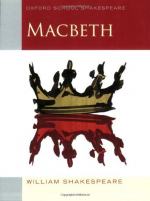|
This section contains 7,735 words (approx. 26 pages at 300 words per page) |

|
SOURCE: Brooke, Nicholas. Introduction to The Oxford Shakespeare: The Tragedy of Macbeth, edited by Nicholas Brooke, pp. 1-82. Oxford: Clarendon Press, 1990.
In the following excerpt, Brooke surveys the importance of stage illusion to Macbeth and examines Shakespeare's rich use of language in the drama.
1. Illusion
Macbeth was first produced at a time of radical theatrical change in England. It seems to have been written during 1606 and to have been presented at the Globe Theatre fairly late in that year, and so to have been conceived for performance in daylight, in a constantly light space which could not be physically transformed into darkness. Two years later, in 1608-9, Shakespeare's company, the King's Men, took over the Blackfriars Theatre which had been adapted from the hall of the medieval friary and was therefore basically a dark space into which artificial light had to be introduced—which has been the normal...
|
This section contains 7,735 words (approx. 26 pages at 300 words per page) |

|


